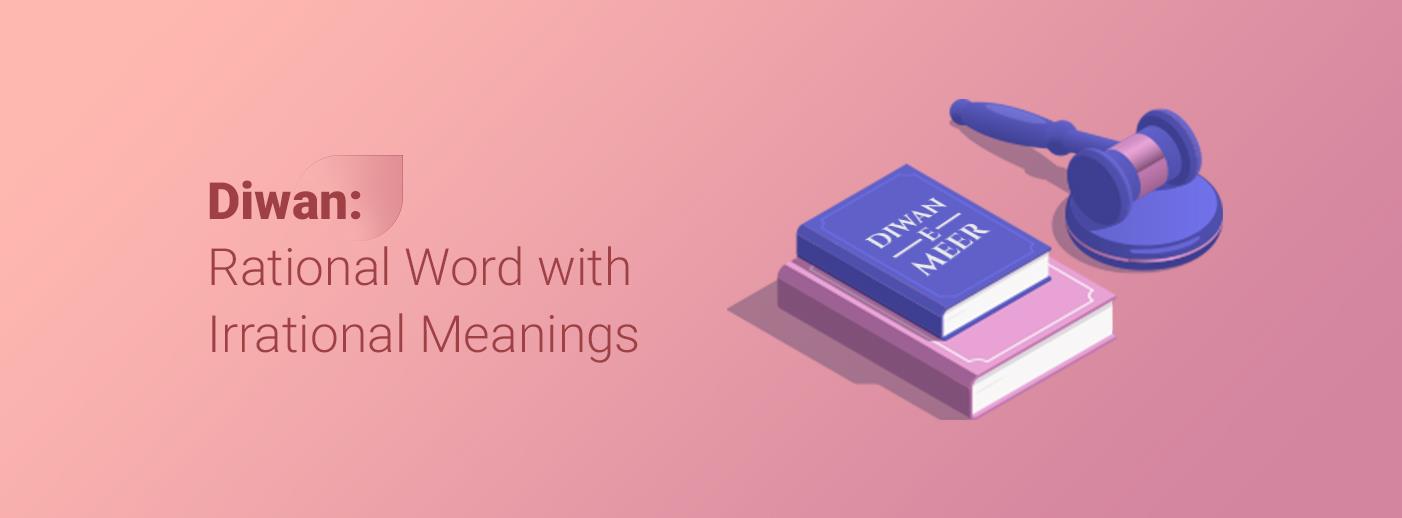अधिक खोजे गए शब्द
सहेजे गए शब्द
खिस्यानी बिल्ली खम्बा नोचे
जिसे क्रोध आ रहा हो वह अपनी खीझ या क्रोध दूसरों पर उतारता है, लाचारी में आदमी दूसरों पर क्रोध करता है, लज्जित व्यक्ति दूसरों पर अपनी लज्जा उतारता है, निर्बल की खीझ
कोशिश
कोई काम करने के लिए विशेष रूप से किया जानेवाला प्रयत्न, मेहनत, दौड़ धूप, प्रयत्न, प्रयास, चेष्टा, उद्योग, श्रम, उद्यम, उपाय, परिश्रम
आठ बार नौ त्योहार
सुख-सुविधा और आराम का शौक़ या लगन ऐसा बढ़ा हुआ है कि युग और समय उसको अल्प व्यय नहीं करने देता
चमनिस्तान
ऐसा बाग़ जहाँ फूल ही फूल हों, ऐसी जगह जहाँ दूर तक फूल ही फूल और हरा भरा नज़र आए, वाटिका, चमन, बाग़
दादरा
संगीत में एक प्रकार का चलता गाना (पक्के या शास्त्रीय गानों से भिन्न), एक प्रकार का गान, एक ताल
Diwan: Rational Word with Irrational Meanings

jaane kaa nahii.n shor suKHan kaa mire hargiz
taa-hashr jahaa.n me.n miraa diivaan rahegaa
Meer Taqi Meer
If you’re here early, you know it’s the season of festivities, celebrating different Indian Demi-Gods and -Goddesses.
If celebration is something to be taken as a precursor of things to come, you’d sure have caught the whiff that Jashn-e-Rekhta is coming back this year. In case you don’t, you can glean all the details here.
Now, Jashn-e-Rekhta is the grandest celebration of Urdu poetry in all its forms and flavors. But do you know where to find Urdu poetry in all its forms, except the Rekhta website?
In a Diwan.
Of course, Urdu lovers already know what the word is all about, but there are less-known findings and affinities about the word that can strike all readers as unique. So, let’s dive right into it.
The word Diwan boasts scores of meanings, ranging from a royal court; tribunal of justice or revenue; an account-book; a collection of poems in the alphabetical order of the final letters of the various end-rhymes; and finally, a miscellaneous collection from different authors. So, you see how diverse the meanings are, from being an assembly of humans on one side to being a collection of verses on the other, the word has quite an extent to cover.
But do you know what are the word’s building blocks?
Diwan is actually a Persian word, originally pronounced as Dewan. The word is actually made up of the Sanskrit-loaned Dev (deity) and the plural-making component Aan (as in Yaaraan, Aashiqaan, etc.)
In essence, the word is just the perfect substitute of the Hindi Devo.n or Dev-Gan. But neither of those words capture the world of meanings Diwan encompasses. As a matter of fact, the Sanskrit Diwan actually means a head, leader, or chief. So, how do we get to all those connotations?
Well, Dev in Persian means a person of large stature. But more commonly, it has largely negative connotations, meaning a demon or a behemoth – which is evidently contrary to its conventional Sanskrit meaning but actually congruent with its original sense.
Just to digress, from the same etymological lineage we get Diwana. An amalgam of Dev (fiend) + Aana (Like), it means fiend-like or mad/lunatic, a well-known word often used to describe the ideal lover who has lost his sanity for the Beloved. This suffix Aana is the same as the Hindi ‘Saa’, coming across as Dev Saa, and clubbing with many other nouns like Aashiqana, Rindaana, Haryana, etc.
kabhuu ronaa kabhuu ha.nsnaa kabhuu hairaa.n ho jaanaa
mohabbat kyaa bhale-cha.nge ko diwaana banaatii hai
Khwaja Meer Dard
Moving on, as we touched upon above, the Persian-adopted Dev also means a big, prominent figure, so if you pluralize that, it becomes a bunch of important personalities that are assembled in one place. This place eventually came to be known as a Diwan, or a royal entourage of courtly men, simply put, a King’s court where his courtiers are present in His service.
That’s why we’ve grown an ear to phrases like Akbar’s fabled Diwan-e-Khas, A privy-council chamber, Diwan-e-Aam, a court for commoners, and Diwan-e-Aala, an upper court.
I know what you must be thinking at this point, “all that’s great to know, but Rajat, what has it got to do with Mother Poetry?”
To that, we’re just there!
Earlier, Diwan also used to mean a scroll (Daftar) that had the names of all these courtiers, this also included military men, so gradually, it was adopted into meaning a military pay-book, documenting the ingress and outgress concerned with different military leaders.
Now, turn your head back and look into the bygone lane of the past. Able to see something with a blurry lens?
No? I’ll tell you.
You’re looking at military officials that were also great poets of the Persian language, starting from Rudaki, Auhadi, and Maghribi and all the way to Aseer, Shaukat, and even Bedil.
So, what happened over time, the notes of these military men also came to be known as Diwan, and now as we know, these weren’t any notes, these were poems that generations of people held close to their hearts.
Interestingly, a Diwan in its original sense was a collection of verses from different authors – more like an Intekhab (selection) – that biographers and connoisseurs collected select verses and compiled them in one place. Thus, it was only much later that Diwan emerged as a text of poetry associated with individual poets. As an effect, we see Diwan-e-Hafiz, Diwan-e-Bedil, Diwan-e-Ghalib, etc.
And that’s the story of how the word Diwan turned from a proper rational noun into an irrational one, defying all syntactic logic as we understand!
'KHandaa.n' tire diivaan kii diivaanii hai duniyaa
har shaKHs KHariidaar hai maaluum nahii.n kyuu.n
Kishanlal Khandaan Dehlvi
Also, if you chart the word’s course through the length of this blog, you’ll see that there is a literal shift from reason to non-reason as well, as Diwan includes men of reason, while Diwana is someone who has crossed into unreasonability!
Know any other words with this uncommon behavior? Drop them in the comment box below.
Delete 44 saved words?
क्या आप वास्तव में इन प्रविष्टियों को हटा रहे हैं? इन्हें पुन: पूर्ववत् करना संभव नहीं होगा





